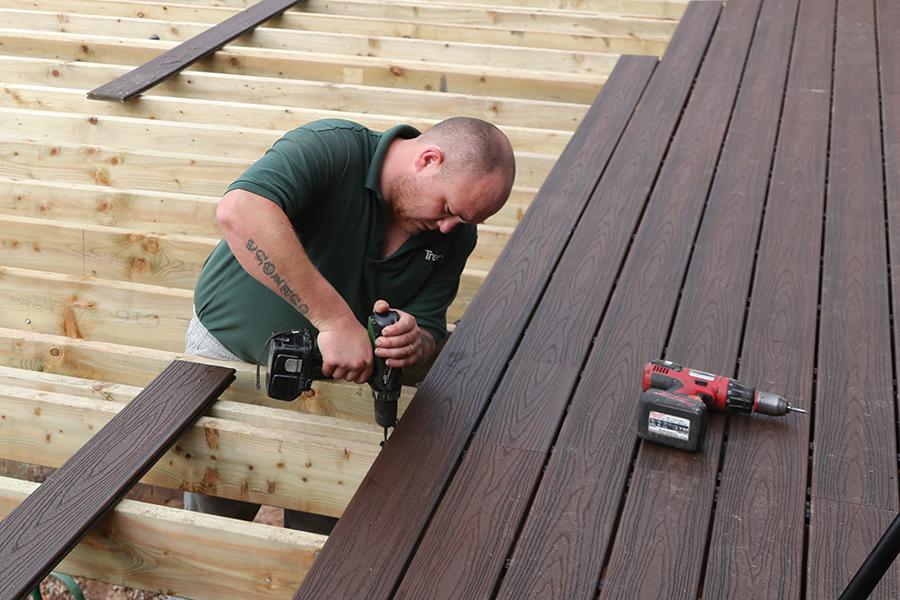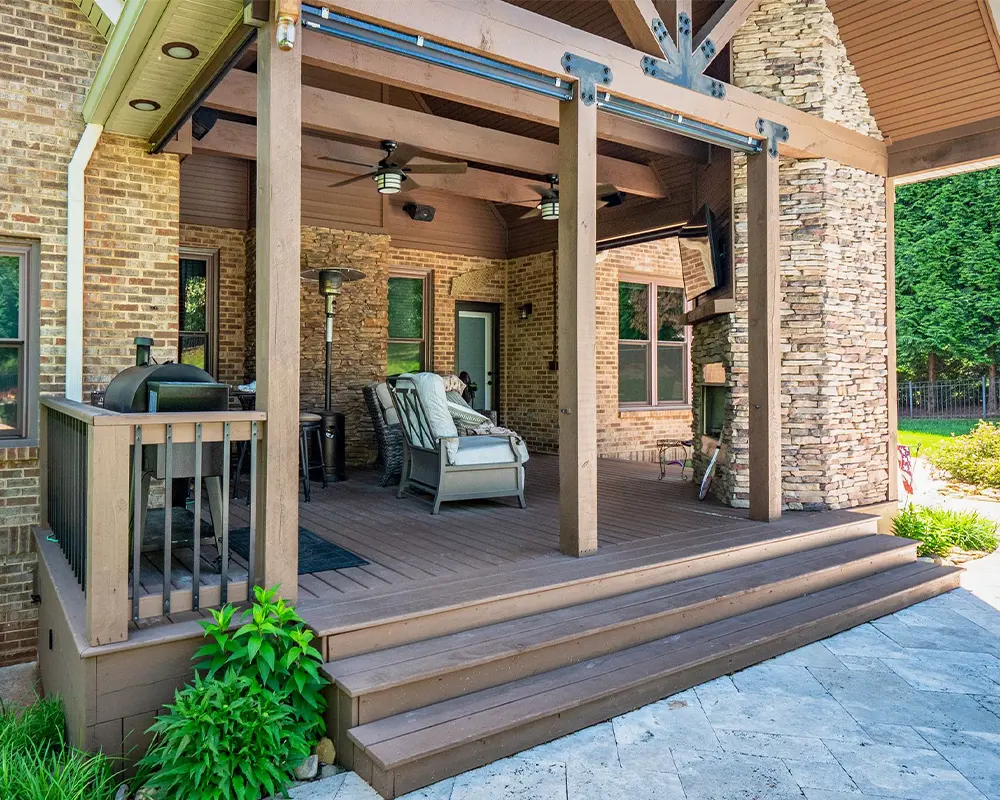Before summer arrives, get advice from a skilled deck installer Austin to get your project moving.
Before summer arrives, get advice from a skilled deck installer Austin to get your project moving.
Blog Article
Just how to Select the Right Materials for Your Deck Setup Task
Choosing the suitable materials for your deck setup job can seem daunting. The key is to balance your budget, style choices, and way of living needs to develop a deck that will improve your outside space for years to come.
Understanding the Various Sorts Of Deck Materials
When starting a deck installation job, the option of products ends up being a critical choice. Various choices are readily available, each with unique attributes and visual charm. Conventional wood, as an example, uses a classic, all-natural appearance and is typically extra economical. It can warp over time and calls for routine maintenance. Compound products, on the various other hand, are a blend of timber and plastic, giving durability and resistance to weather aspects. They demand less upkeep compared to timber however are normally much more costly. An additional alternative is vinyl, which is essentially maintenance-free and resistant to parasites and rot, albeit less natural-looking. By comprehending these distinctions, property owners can make a more educated decision on one of the most ideal deck material for their specific requirements.
Evaluating the Resilience and Upkeep Needs of Deck Products
Analyzing the durability and upkeep demands of deck materials is a crucial step in deck installment. Sturdiness entails the material's capacity to hold up against harsh weather condition conditions, wear and tear, and its durability.
Comprehending upkeep requirements is just as important. Some materials require routine sealing or tarnishing to maintain their look and stand up to wetness damage, while others, like composite outdoor decking, demand less upkeep. By assessing these aspects, one can choose one of the most ideal decking product, guaranteeing an equilibrium in between sturdiness, maintenance needs, and aesthetic appeal.
Price Analysis: Comparing Timber and Composite Decking
Although price may at first feel like a second concern, it is a considerable factor when comparing wood and composite outdoor decking. Timber, generally a much less costly alternative, has a lower upfront expense. Over time, upkeep costs can accumulate, potentially making wood extra costly in the lengthy run. These maintenance costs might consist of staining, sealing, or changing harmed boards. On the other hand, composite decking, while pricier originally, requires much less upkeep, possibly decreasing lasting costs. Yet, it's vital to bear in mind that composite outdoor decking isn't unsusceptible damage, and replacement prices can be high. Therefore, potential deck owners should consider their spending plan and willingness to preserve their decks when making a decision in between wood and composite decking.
Aesthetic Appeals and Layout Adaptability of Decking Products
While cost is an essential factor to consider, the aesthetic allure and style flexibility of decking materials likewise play a considerable function in the decision-making process. Different products supply varying degrees of visual appeal. For circumstances, all-natural wood outdoor decking supplies a timeless, timeless look, while composite materials offer a wide variety of colors and textures to suit diverse tastes and styles. Style versatility refers to the ability to form and control the outdoor decking product to fulfill certain style needs. Timber, for example, uses high design versatility due to its convenience of cutting and shaping. Compound products, while less versatile in style, are still adaptable sufficient for most deck styles. These factors, therefore, are important determinants in the option of outdoor decking product.
Environmental Effect of Decking Materials
When picking outdoor decking materials, one should take into consideration not only visual appeals and sturdiness, but likewise the environmental effect. It is essential to analyze the sustainability of materials and discover recycled outdoor decking choices. Understanding the potential effect on neighborhood communities will certainly make certain a more eco responsible option.
Analyzing Material Sustainability
In the realm of deck building and construction, evaluating material sustainability is a crucial step. This includes examining the ecological influence of each potential material, considering elements such as the power needed for its manufacturing, its carbon impact, and its end-of-life disposal or recycling choices. Wood is a renewable resource, however unsustainable logging practices can lead to logging. Alternatively, composite outdoor decking products frequently incorporate wood and plastic, reducing the demand for brand-new lumber but increasing dependence on fossil fuels. Aluminum and other steels might be a lot more resilient and recyclable, yet their removal and handling can be energy-intensive. Thus, the choice of decking products should balance performance, aesthetic appeals, price, and sustainability to make sure an accountable and durable installment.
Recycled Outdoor Decking Alternatives

Composite decking is especially popular due to its durability and simplicity of maintenance. Recycled plastic outdoor decking, on the other hand, is extremely resistant and needs very see little maintenance.

Effect On Local Environments
While the benefits of utilizing recycled materials for outdoor decking can not be overstated, it's just as essential to take into consideration the wider environmental implications of these selections. Proper disposal of old outdoor decking is vital to decreasing land fill waste. Essentially, an eco-conscious deck task demands cautious material option, sustainable sourcing, and accountable disposal.
Making Your Decision: Tips for Picking the Best Deck Products
As the write-up changes into the subtopic of "Making Your Decision: Tips for Choosing the most effective Deck Materials", it is critical to understand the range of deck products available. Striking an equilibrium in between sturdiness and looks is essential in this choice procedure. The adhering to discussion will lead readers in making an educated choice based on these crucial factors to consider.
Understanding Different Deck Materials
The task of picking the ideal materials for your deck setup can seem daunting due to the substantial variety of choices available. Plastic or PVC decks are even more resilient and like this require much less maintenance than composite materials, yet they can look less all-natural. Aluminum decks are solid, lightweight, and resistant to rot, yet they are additionally the most costly alternative.
Resilience vs. Aesthetics Equilibrium
Stabilizing toughness with aesthetic appeals can be a challenge when picking deck materials. The choice typically steams down to personal choices and the deck's planned use. High-traffic locations may demand resilient products like composite decking, which holds up against damage but might lack the all-natural charm of timber. On the other hand, timber supplies a classic allure and heat that synthetic products struggle to replicate. It calls for much more upkeep and might not last as long. House owners require to strike an equilibrium, considering both the deck's functional needs and their visual choices. By doing so, recommended you read they can guarantee their deck remains a useful and eye-catching exterior space for many years ahead.
Conclusion
Finally, choosing the right products for your deck installment job requires mindful factor to consider of aspects such as sturdiness, maintenance, cost, aesthetics, and ecological effect. Whether you select traditional timber or composite materials, your choice needs to line up with your budget plan, design choices, and lifestyle. Inevitably, the very best outdoor decking material is one that improves your outside space and gives pleasure for several years ahead.
Report this page